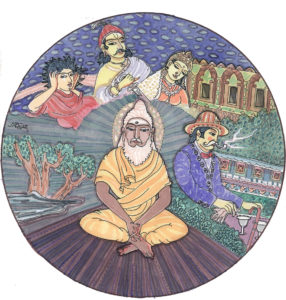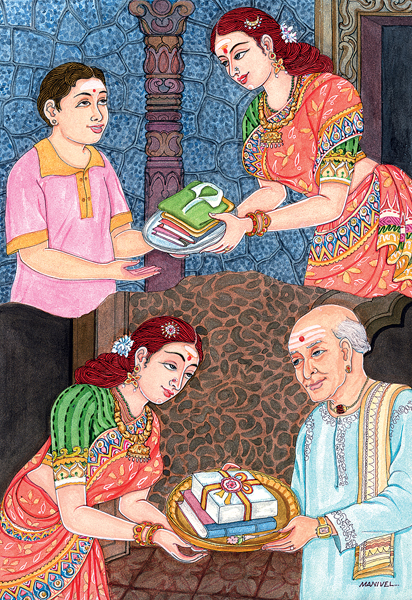Karma may be better known as a Buddhist concept, but it is a very important aspect of the Hindu religion as well. While the term has become quite well known even among Westerners (think “My Name is Earl”), it is often not fully understood. The exact philosophical definition of karma can vary slightly from one religion and one tradition to the next, but the general idea is the same.
A universal system of actions and reactions
Hindus believe that the soul is reincarnated, passing through a series of successive lives, a cycle known as samsara. Each new incarnation is based upon how the previous life was lived. If someone committed harmful actions in their previous life, they can expect harmful effects in the next. If they do good deeds in their past life, they can expect good to come to them in their reincarnation.
 According to the Vedas (sacred Hindu texts), if an individual sows goodness, they will reap goodness and if one sows evil, they will reap evil. Hindus believe that this principle of cause and effect governs all life.
According to the Vedas (sacred Hindu texts), if an individual sows goodness, they will reap goodness and if one sows evil, they will reap evil. Hindus believe that this principle of cause and effect governs all life.
People build up karma, both good and bad, throughout their entire lifetime based on their actions. Whatever karma they have built up will stay with them and affect all of their future lives and existences. This concept is important within the Hindu religion because it requires people to take responsibility for their actions either within this life or the next.
Karma is not Fate
It is important to understand that karma is not the same thing as fate. Humans have free will and are responsible for their own actions and destinies. We create our own karma based on the things that we do. According to Hindu beliefs, only beings that are capable of distinguishing right from wrong can accumulate karma. Therefore, animals and young children do not accumulate karma because they are not capable of making such a distinction.
 The concept of karma is a logical way for people to make sense of good and evil and to understand the different moral status of different creatures. Unlike Christianity, karma is not based on rules laid down by any god. Karma works on its own, without any other being passing down rewards or punishments. It gives believers a sense of control over their own lives and also forces them to be responsible for their actions. They know that with each and every action they take they are determining the quality of their future lives.
The concept of karma is a logical way for people to make sense of good and evil and to understand the different moral status of different creatures. Unlike Christianity, karma is not based on rules laid down by any god. Karma works on its own, without any other being passing down rewards or punishments. It gives believers a sense of control over their own lives and also forces them to be responsible for their actions. They know that with each and every action they take they are determining the quality of their future lives.
Three types of karma have been defined within the Hindu religion. Sanchita karma describes the sum total of past karmas yet to be resolved. Prarabdha karma is the portion of sanchita karma that is to be experienced in this lifetime and kriyamana karma is the karma that is currently being created, the effects of which will be seen in the future.
The theory of karma in Hinduism, Buddhism, and Jainism
Many different religions that include reincarnation in their beliefs, including Hinduism, Buddhism, and Jainism believe in the theory of karma. However, each religion has different beliefs as to exactly how karma works. While it may seem like a simple concept, there is a lot more to it than meets the eye. Much has been written on the theory of karma and how it operates within different religions if you are interested in learning more.






